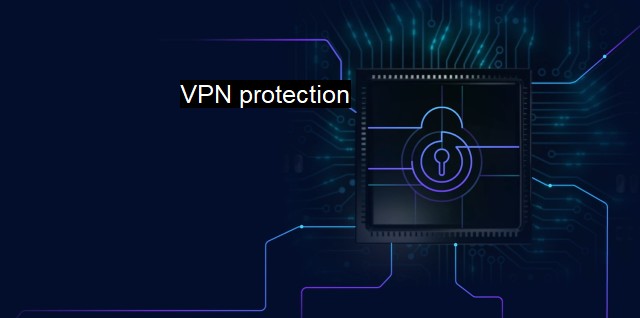What is VPN protection?
The Importance of VPN Protection in Today's Digital Era for Cybersecurity
A Virtual Private Network, commonly known as a VPN, serves as a powerful tool in the cybersecurity world. This technology has steadily been attractively vital in the digital age due to its ability to offer an exceptional level of data protection. VPN protection relates to the ability of a VPN to guard online privacy, secure sensitive data, and grant unrestricted access to the web by covertly connecting individuals or networks over trodden networks akin to the internet.Cybercrimes have burgeoned as more of our day-to-day interactions continue to gravitate towards the digital space – from shopping online to communicating across various platforms securely. In this context, VPN protection is a proactive and preventive measure an individual or an organization can take to ensure their digital activities do not fall prey to criminals.
VPN protection works by transforming a public internet connection into a personalized private network, providing an encrypted connection for your data when it travels between your device and the servers. The primary role of VPN protection is that it furnishes the user with a new IP address from a service provider, thus boosting their confidentiality by invisibly combining them with the multitude of VPN service users worldwide. As this happens, it aids to mask the users' web-generated traffic within all-encompassing private channels, fortifying their connection from external interceptions.
Similarly, it serves a practical use of securing connections coming from unguaranteed Wi-Fi hotspots, which are typically targeted by hackers due to their weakest encryptions. Utilizing a VPN, the connectivity occurs within an encrypted tunnel which provides a strong shield against potential interference, hacking, or eavesdropping.
Thus, VPN also actively dovetails with antivirus software, its compatriot in cybersecurity to offer comprehensive security. Both entities complement each other – while antivirus software is deployed to actively scan for malware and sinister nightmare bugs in your gadgets, the VPN hides your identity, concealing your online activities from would-be cyber attackers. This serves a dual protective front, offering immunity against both incoming and outgoing threats when sequentially functioning side-by-side.
It is interesting to note that VPN protection is based on several fine-threaded elements: the level of encryption, the VPN protocols used, and whether it has a zero-log policy. Usually, high-level VPNs employ military-grade, 256-bit AES encryption that is virtually infeasibility to breach, ensuring that sensitive information remains safeguarded. The VPN protocols help dictate how data is transmitted across the connection. Popular protocols include OpenVPN, WireGuard, and IKEv2, each offering different advantages in speed, security, and compatibility. Zero-log is another essential feature – a zero-log or no-log VPN does not store any identifiable data on users’ activity.
Beyond protecting from cyberattacks, VPNs can be fundamentally instrumental in preserving our commanding rights to internet freedom. In certain jurisdictions where internet censorship is high, a VPN can serve as a flagbearer of digital liberty by bypassing local internet restrictions and network firewalls to allow access to globally available content.
It is vital to acknowledge all VPNs are not made alike. Some are plagued with weak security provisions, irrational privacy policies, or simply exist to veil malevolent activities. Care must be taken to choose a reliable VPN provider adhered to the stringent no-logs policy, leveraging securely encrypted tunnels and offering adequate customer support.
"VPN protection" is a potent shield in the glaring world of cybersecurity. VPNs build private tunnels in a public network for the user, assign a new private IP address, camouflage beneath encrypted data and most ambitiously, challenge restrictions to provide sovereign browsing experience, all of these under a security-vouched auspice. While it can be effectively paired with antivirus software for a well-rounded safety measure, the ultimate impassable security fortress remains within our basic principle – to always adopt meticulous online hygiene practices.

VPN protection FAQs
What is VPN protection?
VPN protection refers to the security measures taken to protect your internet connection and online privacy by encrypting your internet traffic and hiding your IP address. This protects your data from being intercepted or accessed by hackers, cybercriminals, or government agencies.Why do I need VPN protection?
You need VPN protection to safeguard your online privacy and keep your data secure from cyber attacks. VPNs provide a secure and encrypted connection between you and the internet, making it virtually impossible for anyone to steal your data or access your private information. VPNs are also necessary when accessing public Wi-Fi networks, which are susceptible to cyber attacks.Can VPN protection prevent viruses and malware?
VPN protection can prevent viruses and malware to some extent, but it is not a replacement for antivirus software. While a VPN will encrypt your data and protect your online privacy, it does not scan your device for malware or viruses. Therefore, it is important to have antivirus software installed on your device in addition to using a VPN.Is VPN protection legal?
Yes, VPN protection is legal in most countries. However, there are certain countries, such as China, Iran, and North Korea, where VPN usage is heavily restricted or banned entirely. Before using a VPN, it is important to research the laws and regulations in your country to make sure that VPN usage is legal.| | A | | | B | | | C | | | D | | | E | | | F | | | G | | | H | | | I | | | J | | | K | | | L | | | M | |
| | N | | | O | | | P | | | Q | | | R | | | S | | | T | | | U | | | V | | | W | | | X | | | Y | | | Z | |
| | 1 | | | 2 | | | 3 | | | 4 | | | 7 | | | 8 | | |||||||